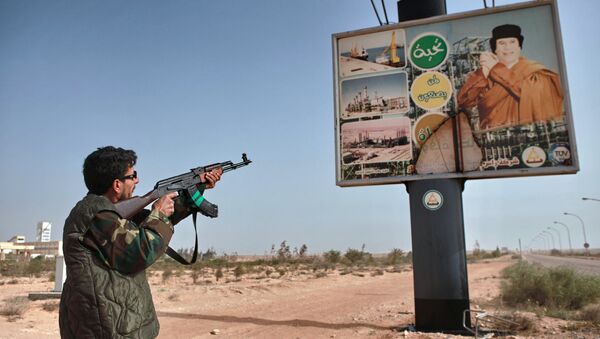While talking in the Norwegian parliament about the nation's largest overseas operation in decades, Foreign Minister Ine Eriksen Søreide cited deficient international efforts in Libya after the attacks in 2011, when Norway alone dropped nearly 600 bombs on various targets, assisting to overthrow Muammar Gaddafi.
The foreign minister cited insufficient resources to secure peace in Libya following the NATO bombings.
"Not enough was done to stabilise Libya after the attacks and there was no political will among the members of the Security Council to establish peacekeeping forces", Søreide said, as quoted by national broadcaster NRK.
Søreide also ventured that Libyan society turned out to be much more complex than previously believed, which is why after some positive signs in 2011, the situation quickly took a turn in the wrong direction.
"The lesson is that one must have a plan to follow afterwards", the Norwegian foreign minister said.
READ MORE: Norwegian Politicians Regret 2011 Libya Bombing as Report Finds It 'Ill-Advised'
However, Ine Eriksen Søreide also cited a previous report by a committee led by former Conservative Foreign Minister Jan Pettersen, which ruled that Norway's decision to join the NATO-led coalition had a firm legal basis, stressing that the Pettersen committee report should form a foundation for subsequent operations.
"It is important to remember that the decision had a solid international law basis", Søreide said.
Søreide stressed that the Libya operation was "unique in several ways", as nearly all of Norway's allies "largely agreed that the use of force was justified".
Eriksen agreed that the world community lacks a perfect system for making such decisions, but pointed out other cases when intervention could have happened to prevent major consequences, such as during the Rwandan Civil War.
Søreide's take was backed by current Defence Minister Frank Bakke Jensen, who stressed that the decision to send soldiers into conflict, one of the most serious in the Nordic country's modern military history, was taken in line with existing laws and regulations. Bakke Jensen argued that it wasn't possible to guess what would have happened had NATO not intervened, yet stressed that the Libyan operation proved the importance of having local anchoring.
In the spring of 2017, it was decided that the Norwegian participation in the Libya campaign was to be evaluated, and in September a report was presented that concluded that the "red-green" coalition government, with the then-Labour leader and present-day NATO Secretary General Jens Stoltenberg at the head, largely followed the applicable laws and rules when deciding to send in warplanes.
READ MORE: Norway Attempted Secret Peace Amid NATO Bombings of Libya in 2011 — Reports
Norway contributed 15 fighter aircraft, which released 588 bombs on various targets in Libya. In total, NATO aircraft carried out nearly 25,000 attacks on Libyan forces and government infrastructure targets, plunging the once-prosperous nation into chaos.
Libya has been in a state of political and economic turmoil since 2011, when a civil war broke out resulting in the overthrow of its long-time leader, Muammar Gaddafi. At present, power is split between rival factions in the war-torn country. The eastern part of Libya is governed by its parliament, headquartered in the city of Tobruk and backed by the Libyan National Army, headed by General Khalifa Haftar. At the same time, the Government of National Accord (GNA), headed by Fayez Sarraj, operates in the western part of the country and is headquartered in Tripoli. The political vacuum has allowed terror organisations to gain a footing in Libya. The crisis also triggered a mass exodus of refugees.


